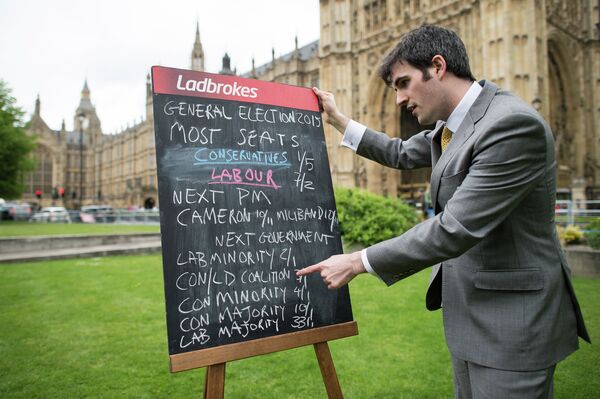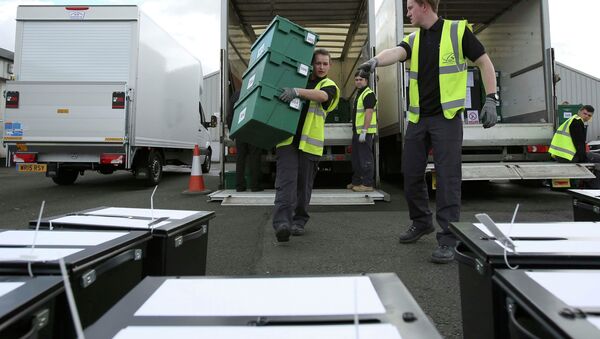MOSCOW (Sputnik) — The country braces for another hung parliament: this refers to a situation where no party has managed to win 326 out of 650 seats, or an absolute majority, in the House of Commons – the country's lower house of parliament.
The United Kingdom has seen a hung parliament only twice in recent history, in 1974 and after the last general election in 2010.
According to final opinion polls, Britain's two largest parties – Labour and the Conservatives – head for the election neck-and-neck, neither expected to collect more than some 280 seats.
A hung parliament would give current Prime Minister and leader of the Conservative Party David Cameron the first right to try forming a new government, even if the rivalling Labour Party receives more votes.
This right is granted by the Cabinet Manual – an official document outlining laws and regulations on formation of the government.
"Where an election does not result in an overall majority for a single party, the incumbent government remains in office unless and until the Prime Minister tenders his or her resignation and the Government's resignation," the Manual reads.
Following the 2010 election, then-prime minister and former leader of the Labour Party Gordon Brown chose to resign from both posts after receiving fewer votes than the Conservatives, seeing that a coalition between the Conservatives and the Liberal Democrats was just around the corner.

CLINGING TO POWER
Brown's choice was just that – a choice, as little can technically force the minister and his cabinet out of office.
The UK Cabinet Manual states that the government is "expected to resign" if it fails to command the parliament's confidence, and if there is a clear alternative.
However, it is not required do so, even if the new parliament dismisses its so-called Queen's speech, which outlines the government's proposed legislative program.
The ability to pass a Queen's speech has traditionally been considered a matter of confidence, but new legislation adopted in 2011 states that the cabinet may only be formally forced out of office through a very specific no confidence motion.
Though coalition governments have been traditionally rare in the United Kingdom, a rapidly changing political landscape has led to this being a widely anticipated outcome of the 2015 election.
A coalition is created when two or more parties join forces to gain broader parliament support.
In 2010, a coalition government was formed when the centre-right Conservatives received the most votes in the election but not enough for a majority, and formed a joint cabinet with the centrist Liberal Democrats.
According to recent media reports, this time around Cameron may attempt to create a Conservative minority government – a cabinet that lacks the support of a majority of parliamentarians.
This would be the least stable of the possible options, and would significantly undermine the government's chances of bringing its policies and pledges into life.
The minority government would also run a much higher risk of being brought down through a no confidence vote.
Whether made up by one or more parties, a minority government may need to strike deals on each piece of legislation it puts before parliament, or, alternatively, it can reach an informal agreement with other parties in return for certain policy commitments.






